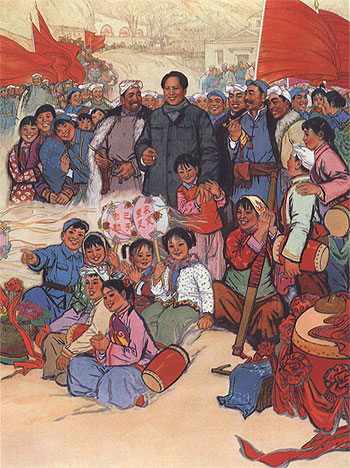New Left Review - Qin Hui: Dividing the Big Family Assets
/ uncommon analysis /

This is an interview with Qin Hui, almost four years old now (brought to my attention via metafilter, triggered in turn by this recent piece), in which the historian discusses a broad range of issues:
Where is the PRC heading? One of its leading intellectual iconoclasts, after describing his origins in the Cultural Revolution, offers a long-range comparative perspective on the Chinese state’s strategy for land and industry today. The divisions in the intelligentsia and the fate of the peasantry, the overwhelming majority of the country, as China enters the WTO.
This is a treasure trove of information and insight for those (like me) who have a superficial knowledge of current China. It offers glimpses of the Cultural Revolution from within (a very different and more nuanced situation than that usually found in western publications), the situation of the peasantry and the problems facing today's China. He also points out the implications of China's current situation for the West:
Obviously, in the manufacturing sector no labour force—either under the welfare system of developed countries, or backed by trade unions in Third World or East European democracies—can ‘compete’ with a Chinese working class that has no right to unions or to labour negotiations. So too, Western farmers who rely on state subsidies may find it difficult to compete with Chinese exporters who can rely on peasant producers who have never enjoyed any protection, only strict control—causes underlying many of the ‘miracles’ in today’s China that often seem equally baffling to Right and Left in the West. In fact, though no one in the contemporary world will say so, such a situation is not without historical precedent. Around the sixteenth century, some East European countries became highly competitive in commercial agriculture by establishing a ‘second serfdom’. You can find people in today’s Chinese think-tanks who understand this very well. In some internal discussions they bluntly state that, as China has no comparative advantages in either resources or technology in today’s world, and cannot advance either to a real socialism or a real capitalism, its competitive edge can only come from its unique system of dependent labour.
Factually, I admit they are to a great extent right. Without this labour system China wouldn’t have been able to pull off the ‘miracle of competitiveness’, which attracts such interest from the West, the former Soviet bloc and many Third World democracies—but which they will never be able to emulate. The question I would ask, however, is whether a ‘miracle’ of this kind is sustainable? We might want to look at the long-term consequences of the ‘second serfdom’ in Eastern Europe. Nowadays there is a lot of talk in the US about a ‘China threat’. Actually, as no big power emerged out of the sixteenth-century East European experience, it is highly doubtful whether the current Chinese miracle could continue to a point where it really did threaten the West. But even if economic magic of this sort, that does not treat people as human beings, did take China to the top of the world, what would be its value? Such a development would first of all threaten the existence of the Chinese people themselves.
I would also highlight this insightful comment:
…The merit of general ‘isms’ lies in the universal values that inform them; yet the specific theory of a given ‘ism’ is usually constructed in response to particular historical questions, not universal ones. Therefore, when we advocate universal values we should be careful not to confuse them with universal questions. My slogan is: ‘isms’ can be imported; ‘questions’ must be generated locally; and theories should always be constructed independently…
No comments:
Post a Comment